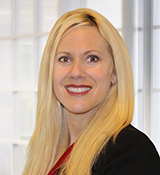Financial Literacy Month is the perfect opportunity to begin teaching your kids about the importance of finance and how to manage money from a young age. Throughout April, our colleagues will be providing helpful tips and insights about the role of finance in their lives, and how they are passing on the lessons they have learned to their children and families. We hope their feedback can assist you when talking to someone in your family about the benefits of understanding the world of finance throughout their lives.
We spoke to April Young, VP, Branch Manager, about when she began learning the importance of finance and what she has taught her teenage children about the value of money. Visit our Financial Literacy page for resources parents and teachers can use when talking to children and young adults about finance.
Why is it important to be financially literate? How have you benefitted from knowing a few things about finance?
It is important to be financially literate to establish a foundation of success. We can plan for future goals and outline the steps to take in achieving them, as well as obtaining knowledge to plan for unforeseen circumstances.
You’ve got teenage children, what have you taught them along the way about the value of money?
Teaching my children started at a young age; getting them excited about responsibility by extending trust and having them learn to evaluate investments with guidance. Custodian accounts or 529s allow for responsible saving for their futures. Student checking accounts and secure cards at appropriate ages allows the building of credit while not extending them beyond the cash they have available.
When did you start to learn about the importance of finance?
I started to learn the importance of finance in high school as a fiercely independent person. I was 15 when I first started working part-time. I was careful in watching my savings grow, and used that to gauge what was required to venture out on my own having come from modest means. I started in the industry at 18 and financial planning became a part of my everyday habits, and at times sacrifice, when prioritizing to manage my money effectively.
What is the best piece of advice in regard to saving/investing/knowledge that you have received or that you have given?
The best piece of advice I have been given is to live within my means. By not overextending myself I was able to achieve my goals and adjust when setbacks occurred without losing what I had already built. Want versus need and the priority of intentional financial decision making needs to take precedence in our lives.
Conclusion
April became familiar with the practical skills and tools she needed to manage her finances through her first job. From her wealth of experience over the years, she has been able to pinpoint ways to manage her money and budgets effectively. As her children grow up, she is giving them timely opportunities to learn about the importance of money in a hands-on way. She encouraged us to “live within our means” and prioritize financial decision making. If you haven’t started already, we encourage you to have conversations with your kids and family about the role of finance in their lives.
Contributor

April Young
VP, Branch Manager
